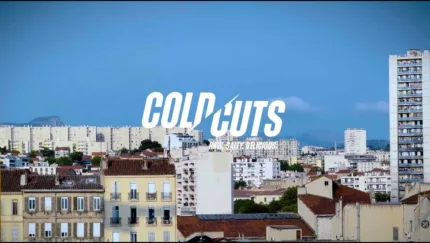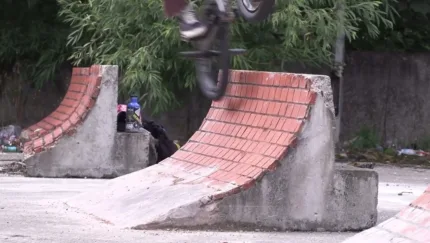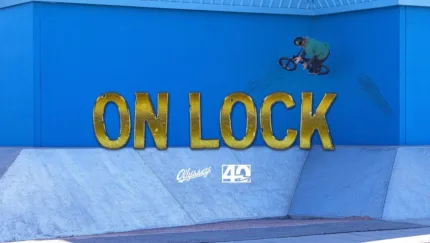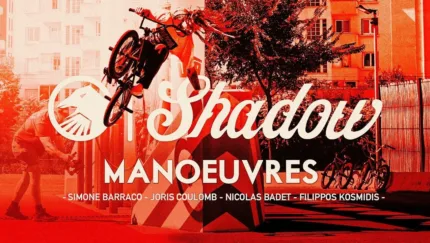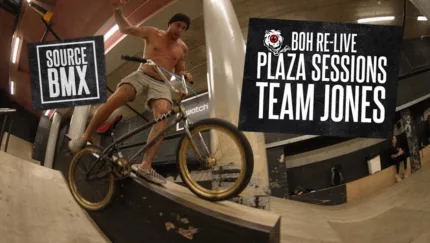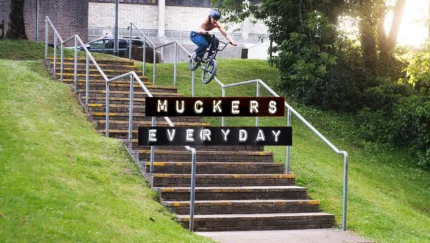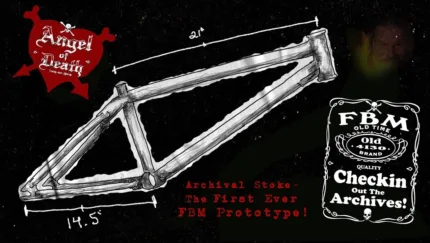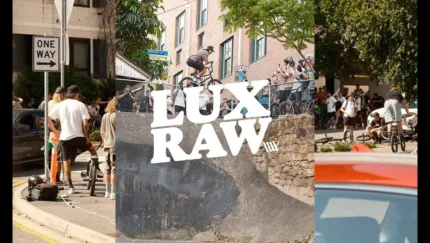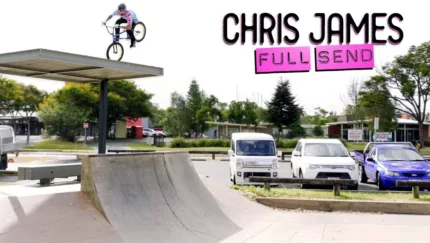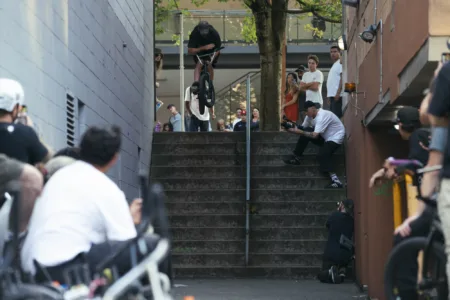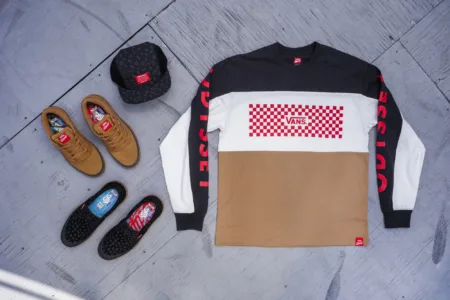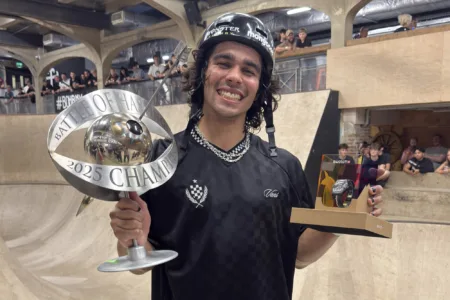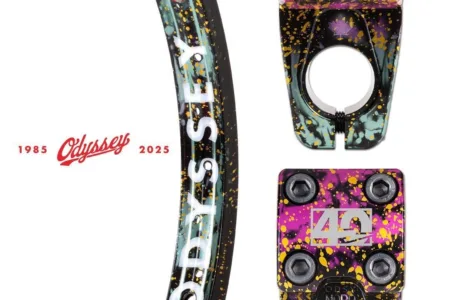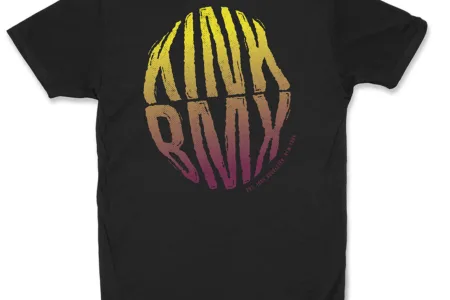
Print Matters: All But Invincible
"We can't be beholden to the masses when it comes to creating art."
25 Jul 2018

An Interview with Mike Hinkens.
During and in between his extended stays teaching abroad in various Latin American countries like Nicaragua and Ecuador, and doing TM duties for Profile's sister brand Madera, Mike Hinkens decided to write a book. One packed with short stories chronologically spanning 20 years, and all related to BMX in some way. Many that are very relatable to anyone who’s been riding for some time. And all very entertaining. Mike was kind enough to do an interview about “All But Invincible”, a laudable contribution to BMX literature.


What inspired and started your journey into writing?
Interestingly, I feel like I have always been into writing. I just don't think I ever realized it. I tried to a write a fantasy book about knights and whatever, but only got about two wide-ruled notebook pages in. That was 3rd grade though, so I may not have been ready. In college, I didn't really mind writing papers (which is all I did as a history major), but that was still homework. And whenever I had the chance to write something about BMX, I jumped at it. I think my first real published BMX writing was an article I wrote to accompany Walter Pieringer's photos from his filming of the Milwaukee scene report in 2006. From there, I wrote a bunch more magazine articles. And then 3 years ago I started the site imprimaturBMX.com, which is devoted to long form "political and cultural" writing about BMX. Yet, I suppose the style of writing that is in this book, narrative non-fiction, really came into my life when Matt Coplon asked me to a write a BMX related short story for his book, "Let Me Tell You About The Time." I really enjoyed turning my animated and rambling real life stories into a written work and thought "Hmmm. I should do more of this."
There are a lot of thought-provoking topics and extensively written pieces on imprimaturBMX.com. What's the significance behind the name, and where do you think Imprimatur BMX fits in the online BMX realm?
This is a big one. First of all, imprimatur means "let it be printed" or its more of way of saying, hey, this is worth writing and should be written. The idea behind that was that there are so many moments in a BMXer's life when they are sitting on a street corner, the deck of a ramp, the back seat of a car, out in the woods, or wherever with their homies, and they are having a deep and meaningful conversation about the culture and/or politics of BMX. A conversation, that seems so important and relevant, but then never goes much further than a passionate "hell yeah, I know, right?!" I wanted to create a place where those conversations could live on, grow, and connect with other people. Our media sites and Facebook do allow for some of this, but it was so often hastily done, disorganized or un-searchable, or met with only snide short shit-talking comments. If it wasn't an edit or a quick blow-by-blow piece, it was not well-received. So, when I had some free time a few years back and was fired up by some less-than-awesome responses I saw on the web about some topic or another, I just said to myself: " Hey, I know people that like to talk about this stuff intelligently. I know people who want to work on bettering BMX by discussing and addressing it as a culture deserving of mature attention. AND, I like to write too... I should create a place for that." So I sat down, wrote a big ol' article about the topic that was firing me up and then built a website. I solicited a bunch of people to write for me, and some have, and have been continuing to write, ask for contributors, or even ask other writers to re-host their older pieces on my site. The idea is NOT to have some huge draw to get clicks and make money, but rather to create a place where BMX can be discussed in deeper ways (if people want to) as well as a place that can serve as a repository for stuff written about BMX that goes beyond more basic stuff. A place for meta-BMX writing. A place, that when someone google searches BMX, it shows up and proves the we are not just vloggers or daredevils. Rather, that we are a distinct and rich culture deserving of respect.
How did “All But Invincible” come about, and what gave you the reason to start it?
Like I said earlier, Matt's book really got me thinking. I started imagining what other stories from my life I would like to write down and then that turned into a note in my iPhone. I started asking my friends, "You always tell me to write a book, but which stories are you talking about?" The list began to grow and before long I had over twenty anecdotes that I thought were funny, entertaining, or worth sharing. I was working full time when this was happening though, so I just left it in my notes and thought I would get to it "some day." Then, when I took a break from teaching and was only working part time for Madera, my schedule opened up significantly. Living abroad and with a part-time job left me plenty of time for projects, so one day, I picked one of the most exciting stories and just started writing. A year later, I had a book in my hand.
How did you come up with the name?
The title of the book was one of the hardest parts. I had been writing down recurring themes and key words as I worked. I wanted to make sure that theses stories, spanning over 20 years, actually connected, so I worked hard to find a common theme, weave it throughout, and make it into a cohesive piece. It only seemed natural that one of those main themes be referenced in the title. One of the themes that repeated throughout the book was me haphazardly taking risks and somehow walking away alive or with little to no repercussions. It seemed like I was invincible. The title "All But Invincible" has two meanings, both being reflections on who I am throughout the book. On one hand, it can be taken as "You may not actually be invincible, but you may as well be since you seem to survive all of this crazy shit, over and over again." On the other hand, it can be taken as "You may think you are invincible, but the reality is, you certainly fall short and are simply one lucky son-of-a-bitch."
The illustrations really add a nice touch to the layout; how did that develop?
I knew I wanted the book to have a cool cover. I also knew that I could not do that on my own. I had recently worked with Russell Wadlin on some graphic design for Madera and pitched him the idea of helping me do a simple cover and nothing else. He said he was interested, but only if he could lay out the whole book. I told him I was working on a shoestring budget, but he told me that he he understood, just wanted the experience and had always wanted to lay out a whole book anyway. We began brainstorming via phone and through a ton of emails. We really fed off each other's energy and got more excited than one would expect over things like kerning and margins. Eventually he turned my rough ideas and sample images into an awesome cover and art work for every chapter. In addition, we spent a lot of time discussing the proper fonts, margins, and more. He took to this project as a work of art, just like I did with my words, and I really think it shows in the finished product. Russell really helped bring the book to life and I couldn't be more stoked on working with him. Also, fun fact: the dog on the cover, which is also featured throughout the book, is modeled after both of my actual dogs.
Were there more stories that didn’t make the cut, or did you have it planned out with the amount you wanted to focus on?
The way I started was to just pick a story from the list on my phone and write it out like a stream of consciousness. In the end, a few stories never even got to that point. As other stories jumped off the list and came to life, I realized a few that I had thought about just wouldn't fit the theme. Those never made it past a few words of reference on a list. On the other hand, lots of stuff got cut. Most of the chapters started out twice their final length. Some were cut to make them flow better, some to keep the flow going. I even wrote a whole chapter that is pre-BMX that never made the cut. Though the book is not ALL BMX, it just didn't seem to fit the narrative so I saved it for a different day.
When did the oldest story take place, and the newest?
The book is in chronological order and the context clues are designed to help you figure out which years things happened in, but I can tell you, the first chapter is about 1995 and the last one was about 2015.
What would you say is your personal favorite story?
I really like most of the stories to be honest. The better question would be: which do I like the least. And that would be the more abstract ones. Ones where the story line was slim and I had to dive deeper than just a narrative. All of the stories are deeper than simple narrative, but some ended up needing more added in to make them substantive. I like the way they turned out, but they were my least favorite to write (probably because they were the hardest to write). On the flip side, Smoke Doggs is my favorite story because it still seems so surreal. I cannot believe how it all played out and the ending was just too perfect. As I began finishing the first draft, I had an epiphany about how to tease the ending in the intro and then have a banger ending. It was like this sudden breakthrough where I laughed out loud and thought "Fuck yeah, I know how to make this awesome. This is sick." It was a new feeling while writing, but felt like seeing a spot you had been searching forever and realizing that the trick you were planning on doing was going to work out perfect there.
What’s your opinion on attention spans these days? Do you think people need to learn to read again?
You know, as a teacher as well as a brand manager, I have learned a lot about how attention spans work and how to get people roped in. I would say that in general, people today are no different than people were 30 years ago: we almost all search for the easiest, quickest, most efficient way to consume things. As such, though I do think people's attention span are quantitatively less than they were even 5 years ago, I don't think its a sign of the end times. It’s just people adapting their pre-existing attitudes to modern (and WAY faster) forms of media. As someone who produces media all the time and in many forms, I think it's up to us producers to decide what the goal of the media is and adjust accordingly. If we want to make sure something sells or is consumed, then we need to make it shorter, ha. But, on the flip side, we can't be beholden to the masses when it comes to creating art. And that's just what this book is: art. Those who want to read it, can, and will. The one cool thing I was NOT going for but seems to be happening is that people who claim to "never have really read," are buying my book and telling me it's the only book they have read in years and are hyped. That is flattering for sure. I don't think I can say that people need to "learn to read again" in reference to modern times, social media, etc, but rather that people need to decide what they value and pursue it (regardless of the distractions this world will inevitably provide).
Will the stories ever go online, or is “All But Invincible” a print-only project?
I was kind of torn about this at first, but as of right now, you can actually purchase the e-version of the book along side the printed version. People were asking for it and at first I balked. Then I sold out of copies and realized, people still wanted to read it and that I may never be able to accommodate that if I didn't make it available online. As I mentioned before, I looked at it as art and would have been happy to only ever hold one copy in my hand. Selling out twice was shocking to me. I had to shift the way I thought about the book and realized, some people wanted to read it for the content, not just to have read it on paper and to put it on their book shelf. I also took into account that I consume almost ALL books now via digital media as I don't have space for books in my mobile lifestyle. So I made an e-version. Plus, I just wanted to see if I could do it. So I read how to make .epub and .mobi files and tried it out.
What are some of your favorite BMX-related literature?
I have to admit, I have been pretty bummed out on BMX literature for a while. I started to feel that I wasn't the audience anymore and strayed far from the traditional stuff for the last few years. I really enjoy when DIG puts up opinion pieces. And I miss when Ride BMX had similar in-depth pieces that were not just interviews, video reviews, or trip blow-by-blows. I subscribe to and love reading Challenger Zine at the moment. It certainly is aimed at my generation and has a little something for everyone. I like how they transcend actual BMX bike riding and cross over to discussion of culture and art in BMX.
In an age where instant and disposable BMX media being the vast majority of consumption by most factions of the riding community these days, where do you see literature and collections of photos and/ or stories fitting into that spectrum?
I see a backlash in BMX at the moment. A few years ago, we were lamenting the death of print, the end of the DVD, and the exodus of photographers. That happened. But then, surprise, surprise, people were bummed and missed those things. And guess what, they started asking for them again. Some people did more than just ask though; they started to create, regardless of profit, advertisers, or sponsors. And now, we have a ton of recurring zines, independent DVDs and full-lengths, and all sorts of one-off projects ranging from books, to art and more. What's really cool is to see people buying and supporting these hard-copy media projects in full force as a reaction to the disappearance of them over the last few years. Especially interested in these projects are people in the mid-school generation (28+). My personal experience has been that those people are reminiscent of the good ol' days and are snatching up anything they can from BMX media that is bigger than just the momentary hot rider/trick/trend. Coffee table book, limited-run hand-made ‘zine, self-produced DVD, whatever, it sells out. I think the people who have been in this lifestyle for the sake of it, for the creative nature, for the art (on and off a bike) are still going to produce cool stuff and it will be consumed by like-minded people, regardless of the rise and fall of the more flashy and obnoxious parts of the culture.
What’s the last book you read?
I kind of read 3 books at once and bounce. Usually something heavy and intellectual, something childish and fiction, and something modern and recommended. I am presently in the middle of "Harry Potter and the Order of the Phoenix" (the easy one) as well as "Evicted: Poverty and Profit in the American City" by Matthew Desmond, a book about racial and social inequality in housing in Milwaukee, and I just finished "The Doomsday Machine" by Daniel Ellsberg, a book about American nuclear war planning and the decision making process in regards to it.
Any plans on doing another book?
Probably. Just not anytime soon, ha. I want to turn back to my heavier stuff on imprimatur as well as start looking into getting my PhD. I am hoping to do a doctorate in BMX in some way so that I can actually publish a book about our culture that has some real research and is done through a historical, sociological, or anthropological lens.
Do you think your doctorate will be based on anything in particular from your site?
As for my doctorate, the plain and simple truth is, I have no idea what it will be about. I know it will center on BMX culture in some way, but first things first, I need to find a doctoral program interested in the culture of an action sport as a point of research. And then I need to see what type of program lens they want to look at it through. Then I need to see what I want to do in that arena... and so on! ha. What I can say is that it would be about BMX and I would try my hardest to address something that enlightens BMX for BMX riders. Not something that uses BMX to prove some other point and that will never be read or useful to a BMXer.
Where can people get a hold of “All But Invincible”?
My website for my other heavier writing has a store on it where you can buy the paper version or the e-version: www.imprimaturBMX.com
Thanks Mike.
Previous
Productivity: Vans - Dakota Roche - "For The Search"
New Colors and Collaborative Designs
Next
Paul Buchanan Photo Pack - BACK IN STOCK
In Support Of Charity
Related Content
















